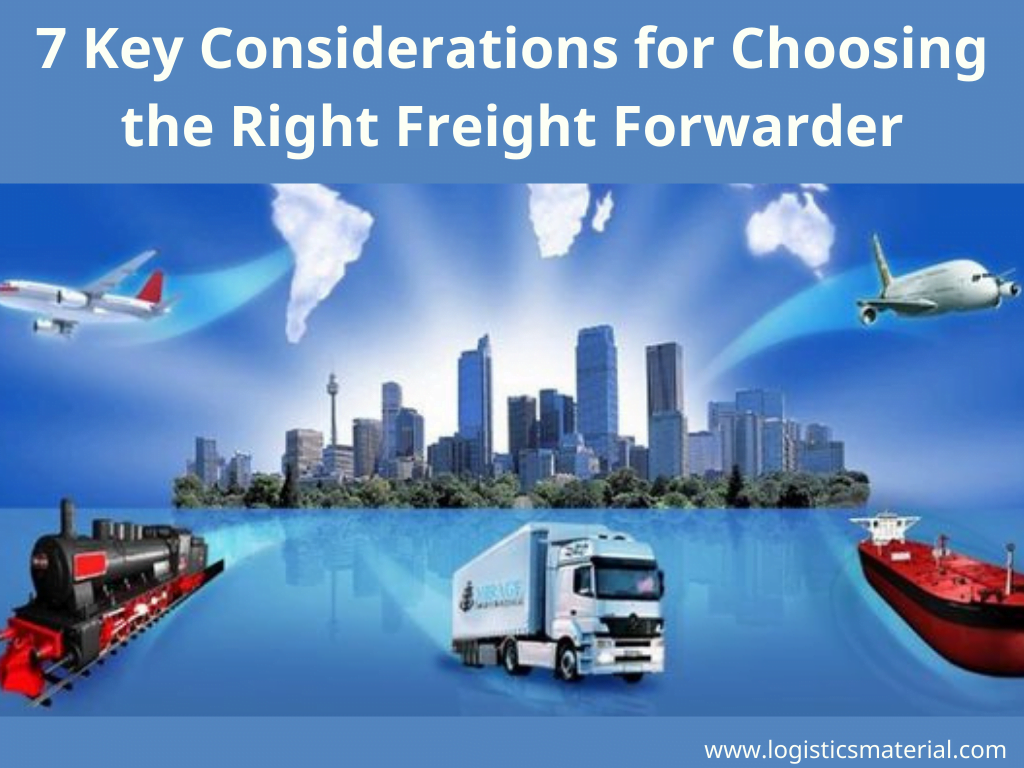
7 Key Considerations for Choosing the Right Freight Forwarder
Introduction
Choosing the right freight forwarder is a crucial decision that can significantly impact the success of your business operations. With so many options available in the logistics industry, it can be overwhelming to determine which freight forwarder aligns best with your specific needs. In this blog post, we will explore the seven key considerations you should take into account when selecting the right freight forwarder for your business. From experience and reliability to cost and customer service, these factors will help guide you toward making an informed choice that ensures smooth and efficient transportation of your goods.
What is Freight Forwarding in logistics
Freight forwarding is one of the key elements of the logistics sector, which is the process of coordinating and moving products from one location to a different one. Essentially, freight forwarders act as intermediaries between shippers and carriers, managing the movement of goods along the supply chain. They handle various tasks such as booking cargo space, arranging transportation, preparing documentation, and managing customs clearance procedures. Freight forwarders play a vital role in ensuring that goods are delivered efficiently and cost-effectively to their final destination. They have an in-depth understanding of international trade regulations, shipping routes, and carrier networks, allowing them to optimize supply chain operations and overcome any logistical challenges that may arise. By leveraging their expertise and industry connections, freight forwarders help businesses streamline their shipping processes, minimize transit times, and reduce overall transportation costs. Choosing the right freight forwarder is essential for the success of your logistics operations, as they can make a significant impact on the efficiency and reliability of your supply chain.
In the following sections, we will delve into seven Key Considerations for Choosing the Right Freight Forwarder
1) Understand your shipping needs
The foundation for a successful partnership starts with understanding your own shipping needs. Before embarking on your search for a freight forwarder, take the time to thoroughly assess your specific requirements. Consider the volume and frequency of your shipments. Will you be shipping large quantities on a regular basis, or are your needs more sporadic and involve smaller volumes? Knowing these details will help identify a freight forwarder with the capacity and resources to handle your specific workload.
Destination is another critical factor. Do you require international shipping to various locations around the world, or are your needs primarily domestic? Understanding your target markets will allow you to select a freight forwarder with expertise in navigating the specific customs regulations and logistics processes of those regions.
The type of goods you’re shipping also plays a significant role. Are you transporting fragile electronics, temperature-sensitive perishables, or bulky industrial equipment? Different cargo types require specialized handling and may necessitate additional services such as temperature-controlled containers or specific packaging solutions. Partnering with a freight forwarder experienced in handling your specific cargo type ensures your goods arrive safely and in optimal condition.
Finally, identify any special requirements you might have. Do your goods require hazardous material handling expertise? Perhaps you need assistance with customs clearance or insurance procurement. By understanding your unique needs from the outset, you can ensure your chosen freight forwarder offers the comprehensive services necessary for a smooth and compliant shipping experience.
By taking the time to understand your shipping needs upfront, you’ll be well-equipped to select a freight forwarder that perfectly aligns with your requirements. This not only guarantees your cargo arrives safely and on time but also lays the groundwork for a long-term, successful partnership that streamlines your entire cargo shipping process.
2) Consider the freight forwarder's experience and reputation
Experience and reputation are crucial factors to consider. A freight forwarder with ample experience in the industry not only understands the complexities of logistics but also has likely encountered various challenges and developed effective solutions along the way. Their expertise can streamline the shipping process and ensure that your goods reach their destination efficiently.
Moreover, reputation plays a significant role in determining the reliability and credibility of a freight forwarder. Researching customer reviews, testimonials, and industry ratings can provide valuable insights into the quality of service offered by the freight forwarder. A reputable freight forwarder is more likely to deliver on their promises, communicate effectively throughout the shipping process, and handle any issues or delays promptly and professionally. By prioritizing experience and reputation when choosing a freight forwarder, you can partner with a trusted logistics provider who can meet your shipping needs effectively and contribute to the success of your business operations.
3) Look for a freight forwarder
with a global network
When selecting a freight forwarder for your shipping needs, it is crucial to consider their global network. A freight forwarder with a robust global network can provide you with a multitude of benefits and opportunities when it comes to transporting your goods across international borders. By partnering with a freight forwarder that has an extensive network of agents, partners, and resources worldwide, you can ensure a seamless and efficient transportation process for your cargo.
This global reach enables your freight forwarder to offer a wide range of services, access to various transportation modes, and expertise in navigating complex international regulations and customs procedures. Choosing a freight forwarder with a strong global network can give you peace of mind knowing that your shipments will be handled with precision and care every step of the way, no matter where in the world they need to go.
4) Check for compliance and certifications
As you evaluate potential freight forwarders for your shipping needs, ensuring compliance and certifications should be a top priority.
A reliable freight forwarder must adhere to industry regulations and possess relevant certifications to guarantee the safe and efficient transportation of your goods. Before making a decision, inquire about the freight forwarder’s compliance with international shipping laws and regulations, as well as their track record in meeting industry standards.
Look for certifications such as IATA (International Air Transport Association), FIATA (International Federation of Freight Forwarders Associations), and FMC (Federal Maritime Commission) accreditation, which demonstrate a commitment to professionalism and quality service. By choosing a freight forwarder with the appropriate compliance measures and certifications, you can have peace of mind knowing that your cargo will be handled with the utmost care and expertise throughout the shipping process.
5) Evaluate the technology and customer service offered
When selecting a freight forwarder, evaluating the technology and customer service they offer is crucial to ensuring a smooth and efficient shipping process. A reliable freight forwarder should have advanced technology systems in place to track shipments, provide real-time updates, and streamline communication with clients. Look for a freight forwarder that offers user-friendly online platforms or software that allows you to easily book shipments, track cargo movements, and access important documentation. In addition to technology, excellent customer service is essential when choosing a freight forwarder. A responsive and knowledgeable customer service team can provide assistance and support whenever needed, helping to address any concerns or issues that may arise during the shipping process. Consider the level of support the freight forwarder offers, such as dedicated account managers, 24/7 customer service availability, and proactive communication regarding shipment status updates. By evaluating the technology and customer service offerings of a freight forwarder, you can ensure that you are partnering with a reliable and efficient logistics provider that will meet your shipping needs effectively.
6) Compare pricing and value-added services
When it comes to choosing the right freight forwarder for your business, comparing pricing and evaluating value-added services are crucial steps in the decision-making process.
While price is a crucial consideration, choosing a freight forwarder shouldn’t be based just on it. You should take into account the freight forwarder’s whole value offering, which includes any extra services in addition to standard freight transit.
Value-added services such as customs clearance assistance, warehousing, insurance options, tracking capabilities, and specialized handling can significantly enhance the efficiency and effectiveness of your supply chain operations. By comparing pricing structures and evaluating the full range of services offered by different freight forwarders, you can make an informed decision that aligns with your business needs and budget constraints. Remember, the cheapest option may not always be the best choice if it lacks the necessary value-added services to support your logistics requirements effectively.
7) Seek references and reviews from other clients
Seeking references and reviews from other clients can be an invaluable step in choosing the right freight forwarder for your business needs. Hearing directly from other clients about their experiences with a particular freight forwarder can provide you with valuable insights into the quality of service, reliability, and overall satisfaction levels. By seeking references and reviews, you can gain a better understanding of how the freight forwarder performs in real-world scenarios, how they handle challenges and issues that may arise, and how well they communicate and collaborate with their clients. When reaching out to other clients for references, be sure to ask specific questions about their experiences, such as the timeliness of deliveries, the handling of goods, the responsiveness of the freight forwarder’s customer service team, and any unexpected fees or charges that may have occurred. Additionally, reading online reviews and testimonials from other clients can also provide you with a broader perspective on the freight forwarder’s reputation and track record. Look for patterns in feedback, both positive and negative, to help you make a more informed decision about whether the freight forwarder is the right fit for your shipping and logistics needs.
Conclusion
We trust that this blog post has provided you with valuable insights into the crucial factors to consider when selecting the right freight forwarder for your business needs. By carefully evaluating these seven key considerations, you can ensure a smooth and efficient logistics process that meets your requirements and exceeds your expectations. Remember, the right freight forwarder can make all the difference in streamlining your shipping operations and enhancing your overall supply chain management. If you have any further questions or need assistance in choosing the best freight forwarder for your business, feel free to reach out to us at logisticsmaterial.com, we are here to help you succeed in your freight forwarding endeavors. Thank you for reading and happy shipping!
